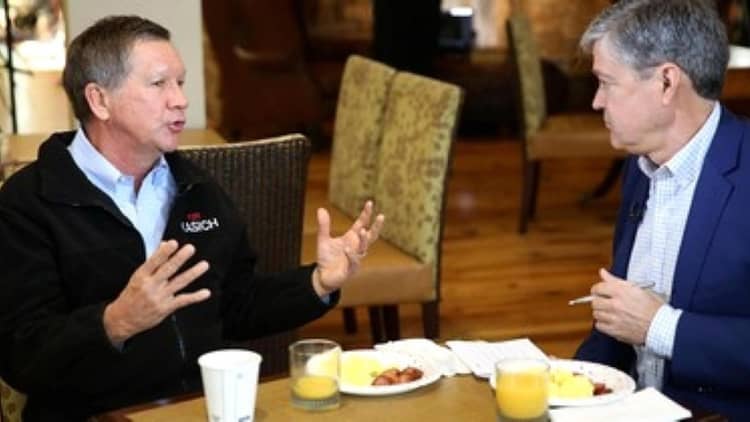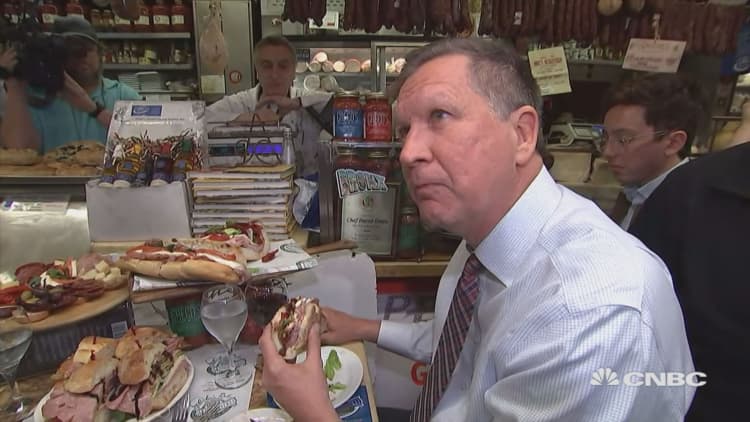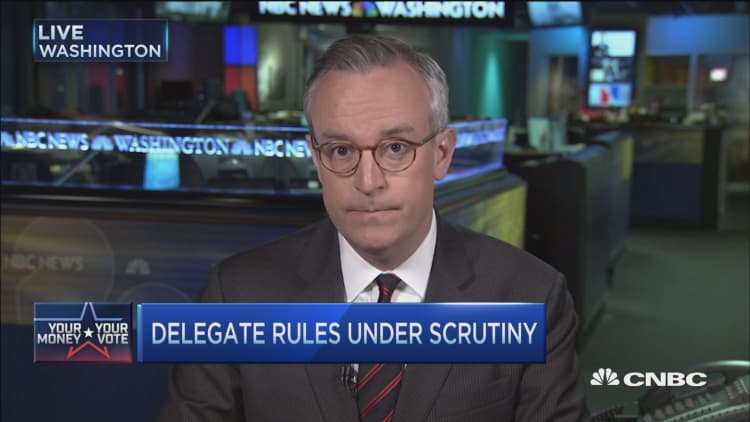


Goodbye, Mr. Nice Guy.
That's the growing refrain from a number of Republican insiders who want John Kasich to drop his campaign and exit the GOP race. But Kasich's team says it has a plan, and its candidate isn't going anywhere.
Following his disappointing third-place finish in Wisconsin this week, where the Ohio governor failed to take even a single delegate from a neighboring state that's traditionally kind to establishment candidates, the voices yelling "Goodbye Mr. Nice Guy" are getting louder.
After months of gliding by, largely untouched by his competitors and the media, Kasich is starting to be treated as a problem. Perhaps the problem, as Donald Trump recently insisted, while demanding the No. 3 GOP contender exit the presidential race.
The campaigns of Trump and Sen. Ted Cruz want to prevent Kasich from even having a chance at the nomination, by pressing the Republican National Convention's rules committee to hold firm to its existing eligibility standards. The 2012 RNC platform — which is subject to review and could be rewritten — stipulated that the eventual Republican nominee must come into the convention with majorities of delegates in at least eight states. Kasich has just one: his home state of Ohio.
At Mastro's steakhouse in Beverly Hills this week, the chief ad-maker for Kasich's "New Day for America" super PAC, Fred Davis, ate with former NFL coach Mike Shanahan. Davis wanted to talk football, but by his account, Shanahan wanted to talk about Kasich. On his mind was a question that a lot of GOP figures are asking: "Why doesn't he get out?"
"Mike, when you were coaching the Broncos, you wouldn't ask New England to step aside," Davis recalled saying in the Tuesday night encounter.
But staying in the race increasingly seems to mean getting into the thick of the fight, and dropping the "nice guy" label, which has served Kasich only so well.
"It's nice thing to do that but he needs delegates somewhere," said Tom Davis, a former Virginia congressman who is Kasich's honorary chair in that state.
The Kasich campaign officially insists that the governor remains as well-positioned for victory as when he got into the race.
"There have been D.C. talking heads who have wanted the governor out for months," Mike Schrimpf, the campaign's communications director, told CNBC.com. "And, in fact, the opposite is now more clear than ever: What Wisconsin showed is we are going to an open convention. There is no doubt about that. And the reason why Trump and Cruz are trying to push us out is they know we can win an open convention."
Kasich has much to prove before then.
The Ohio governor entered the presidential scrum last July as a reluctant late entrant, his strategy built around the idea that his campaign would gain support as rivals dropped away. And while many others have fallen by the wayside, including the cluster of mainstream Republicans (Jeb Bush, Marco Rubio, Scott Walker) that once crowded Kasich's lane, he has yet to make a meaningful breakthrough.
What I find fascinating is Trump and Cruz blaming John for their inability to get to 1,237 [delegates]. They implicitly and publicly are now saying: We are really worried about him.Tom Ridgeformer Pennsylvania governor and Kasich campaign national co-chairman
Since his victory in Ohio, the high-water mark of his campaign, Kasich has failed to win a delegate, while the "Never Trump" crowd has increasingly migrated to Cruz. Campaign insiders admit they were caught off guard not only by Trump's rise — which confounded political experts — but also by how much money Bush sucked up from the Republican donor class. Now there is a new wrinkle: the emergent specter of an effort to draft House Speaker Paul Ryan if the convention is contested, as it seems likely to be.
So how does the Kasich campaign justify itself going forward?
"The good news is I really don't have to," Davis said with a laugh. "It is a plan that will either work or not work, and we will know in a couple months, and it is right now exactly where we expected to be."
Davis did, however, mention that Kasich's super PAC is in the process of releasing new ads that targets those who are wondering the same thing. The new message: The calls for Kasich to drop out are actually a testament to his strength.
"What I find fascinating is Trump and Cruz blaming John for their inability to get to 1,237" delegates, said former Pennsylvania Gov. Tom Ridge, a Kasich campaign national co-chairman. "They implicitly and publicly are now saying: We are really worried about him."
Then again, Ridge acknowledges that the campaign's open-convention rationale to voters is becoming increasingly complicated. "Your bumper is not wide enough to explain it," he joked.
Both Trump and Cruz showed this week that they are no longer going to exclude Kasich from the mud-slinging, which forces the Ohio governor to decide aggressive to get in his own defense.
"When he was congressman, he was a tough, hard-nosed congressman," said Tom Ingram, a senior campaign adviser. "That is the Kasich that we need to see. I don't want him fighting with the guys. I want him competing with them, particularly Cruz."
Though plans remain as fluid as the race itself, campaign insiders agree Kasich's best, if not only, shot at the nomination would be on a theoretical third ballot at the convention.
RNC rules stipulate that most of the delegates are bound on the first ballot of the convention. One third remain bound on the second ballot. The third ballot would find the lion's share of delegates left to their own devices. If it comes to a fourth ballot, however, the assumption is that delegates might be looking for an entirely fresh option, such as Ryan. (Schrimpf said he doesn't expect Ryan or any "white knight" candidate to ultimately get the nomination.)
Ingram said the campaign has been in frequent discussions with delegates who are bound to Rubio on the first ballot; he thinks at least half of them could flip to Kasich by the third ballot. Kasich's delegate czar is Charlie Black, a deeply connected Republican operative who advised the presidential campaigns of George W. Bush, John McCain and Mitt Romney. It will be among his jobs to persuade the rules committee to preserve Kasich's eligibility.
In the interim, Schrimpf said, "Everybody needs to calm down and wait for the rules committee to make the rules and know that, even when they make the rules, those rules can be changed at any point int he convention."
We continue to raise great money and we are in better financial shape than we have at any point in campaign. As the field narrows and choices become more clear, that is advantageous for us.Mike SchrimpfKasich campaign communications director
The campaign is also targeting bound delegates in states with vulnerable Republican Senate incumbents — such as in Illinois and Ohio — who would be most nervous about having Trump at the top of the GOP ticket. The campaign has a 56-jurisdiction delegate strategy, according to a source, which includes places like Guam. While it has operated on a relative shoestring, insiders acknowledge that there is no way to carry out an effective delegate open convention operation without sufficient bodies. Sources said the next batch of campaign financial reports will show a strong spike in fundraising since Kasich's lone primary victory, in Ohio, on March 15.
"We continue to raise great money and we are in better financial shape than we have at any point in campaign," said Schrimpf. "As the field narrows and choices become more clear, that is advantageous for us."
Going forward, the campaign sees its best chance to win delegates in New York, Pennsylvania, Maryland and pockets of California — Silicon Valley and Orange County, where Kasich has a strong donor base.
Kasich is campaigning this week in New York, where a recent Monmouth poll shows him in second place with 25 percent of the vote and Trump with 52 percent.
On Wednesday, Kasich's top strategists gathered with supporters at the American Trucking Association's Washington headquarters, where they painted rosy pictures of the next several races. According to Politico, that included talk of taking most of the delegates in New York. But it's this kind of rhetoric that has, over the months, struck outsiders as either deluded or self-serving.
An October Politico magazine profile of John Weaver, Kasich's chief strategist, presented an unflattering portrait of an operative who has enriched himself in the game of unwinnable politics. When asked whether these perceptions had been taken to heart, Davis (who was also tagged in the Politico piece) said he's seen no evidence of it. (Weaver did not respond to an interview request for the story.)
Schrimpf said he has "not heard a word about that since October."
The Kasich campaign is reluctant to officially set a performance bar for the remainder of the contests — "There is not a magic number that is going to determine whether you are eligible or not," said Schrimpf — but top supporters concede that the candidate needs to fare better than he has since Ohio.
"I would like to see him go in with several hundred more delegates," said Ridge.
Former Sen. Trent Lott, another national co-chairman, said he expects the campaign to go to the convention with 400 to 500 delegates locked up — it presently sits on 143. Lott acknowledged that the case for Kasich would be made increasingly "problematic" if he fails to win another state. "I do think that is a concern," said Lott.
Correction: This story was updated to correct John Weaver's position in Kasich's campaign — chief strategist.



